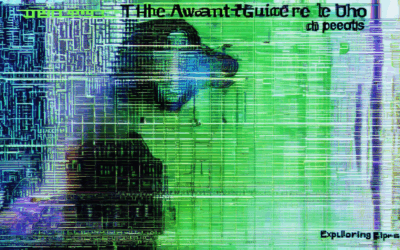Music has always been a cornerstone of culture, shaping identities, inspiring movements, and evolving alongside societal changes. In the vibrant world of rap culture, abstract music plays a pivotal role in shaping its sound, style, and overall identity. From its emergence in the late 20th century to its dominance in modern rap, abstract music has redefined what it means to create and express oneself. This unique form of music, characterized by its unconventional structures, non-linear melodies, and experimental rhythms, has become a hallmark of innovative rap culture.
Key Takeaways
– Drives Innovation: Abstract music is a cornerstone for innovation, redefining rap culture’s sound and identity.
– Bridges Genres: It merges diverse styles like jazz, funk, and electronic, making rap culture more inclusive and diverse.
– Fosters Creativity: By experimenting with sounds, abstract music encourages artists to explore unique visions and storytelling techniques.
– Influences Beyond Music: From fashion to poetry, abstract music impacts various facets of hip-hop culture, symbolizing artistic freedom.
– Encourages Competition: It sparks a competitive spirit, driving innovation and pushing traditional boundaries in rap production.
– Represents a Global Movement: Abstract music transcends borders, inspiring artists worldwide to blend local cultures and create unique sounds, enriching rap’s identity globally.

How Does Abstract Music Influence the Evolution of Modern Rap Culture?
Abstract music has played a pivotal role in shaping the sound and style of modern rap culture, pushing boundaries and redefining expectations through unconventional production techniques and innovative storytelling.
The Rise of Unconventional Sounds
Abstract music in rap culture emerged as a departure from traditional hip-hop beats, introducing experimental sounds that blended elements of jazz, funk, electronic music, and spoken word performances. This approach allowed artists to create more dynamic and visually striking tracks, often accompanied by intricate instrumentals and layered vocals.
Storytelling Through Soundscapes
One of the most significant impacts of abstract music is its ability to enhance storytelling. Artists like J. Cole and Kendrick Lamar have utilized abstract sounds to craft vivid narratives, where the music itself becomes a character in the story. These soundscape choices allow for a deeper emotional connection and a more immersive listener experience.
Influence on Production Techniques
Modern rap producers have adopted and expanded upon the principles of abstract music, incorporating live instrumentation, sampling, and digital effects to create unique textures. Producers like Metro Boomin and 9th Wonder have become renowned for their ability to weave abstract musical elements into tracks that resonate commercially and critically.
Cultural Significance
Abstract music challenges traditional notions of rhythm and melody, reflecting the diversity and creativity within the rap community. This experimentation has fostered a culture of innovation, encouraging artists to push boundaries and explore new sonic territories. Platforms like AbstractHipHop.com highlight these advancements, showcasing the evolution of abstract music in contemporary rap.
Key Artists Embracing Abstract Music
- J. Cole – Known for his intricate, story-driven tracks that often feature abstract sounds and production.
- Kendrick Lamar – Incorporates experimental beats and production techniques that defy conventional hip-hop norms.
- Nas – Utilizes abstract music elements to create a distinctive and impactful listening experience.
- Flying Lotus – A producer and musician who blends abstract music with hip-hop, creating a unique hybrid sound.
Abstract music has not only influenced the sound of modern rap but has also inspired a new generation of artists to explore creative possibilities. Its impact on production, storytelling, and cultural expression continues to shape the evolving landscape of hip-hop worldwide.
What Role Does Abstract Music Play in Shaping the Sound of Rap Culture?
Abstract music plays a pivotal role in shaping the sound of rap culture by pushing boundaries and redefining expectations through innovative production techniques and unconventional compositions. This genre-blending approach allows artists to experiment with sounds beyond traditional hip-hop structures, resulting in a richer and more dynamic musical landscape.
- Innovation in Sound Design: Abstract music introduces unique textures, rhythms, and melodies that challenge conventional hip-hop norms. Artists often incorporate elements from jazz, funk, electronic, and spoken word to create immersive sonic experiences.
- Influence on Subgenres: The influence of abstract music is evident in the rise of experimental rap and beat scenes. Producers and rappers draw inspiration from these sounds to craft forward-thinking tracks that resonate with audiences seeking fresh perspectives.
- Cultural Impact: By challenging traditional structures, abstract music challenges cultural norms and fosters creativity within the rap community. It encourages artists to explore untapped potential while bridging gaps between different musical styles.
- Technical Advancements: Abstract music often features complex layering of samples, live instrumentation, and digital effects. These technical innovations enhance the emotional depth and storytelling capabilities of rap songs.
- Bridge Between Genres: Abstract music serves as a bridge between hip-hop and other musical forms, fostering collaborations and influences that enrich the rap ecosystem. This cross-pollination leads to a more vibrant and inclusive musical environment.
Abstract music is a cornerstone of modern rap culture, driving artistic evolution and inspiring new waves of creativity. Its influence continues to shape the sound of hip-hop, ensuring that the genre remains dynamic and forward-thinking.

How Does Abstract Music Influence the Evolution of Modern Rap Culture?
Abstract music has played a pivotal role in shaping the sound and style of modern rap culture, pushing boundaries and redefining expectations through unconventional production techniques and innovative storytelling.
The Rise of Unconventional Sounds
Abstract music in rap culture emerged as a departure from traditional hip-hop beats, introducing experimental sounds that blended elements of jazz, funk, electronic music, and spoken word performances. This approach allowed artists to create more dynamic and visually striking tracks, often accompanied by intricate instrumentals and layered vocals.
Storytelling Through Soundscapes
One of the most significant impacts of abstract music is its ability to enhance storytelling. Artists like J. Cole and Kendrick Lamar have utilized abstract sounds to craft vivid narratives, where the music itself becomes a character in the story. These soundscape choices allow for a deeper emotional connection and a more immersive listener experience.
Influence on Production Techniques
Modern rap producers have adopted and expanded upon the principles of abstract music, incorporating live instrumentation, sampling, and digital effects to create unique textures. Producers like Metro Boomin and 9th Wonder have become renowned for their ability to weave abstract musical elements into tracks that resonate commercially and critically.
Cultural Significance
Abstract music challenges traditional notions of rhythm and melody, reflecting the diversity and creativity within the rap community. This experimentation has fostered a culture of innovation, encouraging artists to push boundaries and explore new sonic territories. Platforms like AbstractHipHop.com highlight these advancements, showcasing the evolution of abstract music in contemporary rap.
Key Artists Embracing Abstract Music
- J. Cole – Known for his intricate, story-driven tracks that often feature abstract sounds and production.
- Kendrick Lamar – Incorporates experimental beats and production techniques that defy conventional hip-hop norms.
- Nas – Utilizes abstract music elements to create a distinctive and impactful listening experience.
- Flying Lotus – A producer and musician who blends abstract music with hip-hop, creating a unique hybrid sound.
Abstract music has not only influenced the sound of modern rap but has also inspired a new generation of artists to explore creative possibilities. Its impact on production, storytelling, and cultural expression continues to shape the evolving landscape of hip-hop worldwide.

How Abstract Music Shapes Rap Culture’s Sound and Identity
Abstract music plays a pivotal role in defining the sound and identity of rap culture, serving as a cornerstone for innovation and artistic expression. This genre-blurring approach allows artists to push boundaries, combining elements of jazz, funk, electronic, and even classical influences to create unique sonic landscapes.
One of the most significant contributions of abstract music to rap culture is its ability to foster creativity and individuality. By experimenting with beats, melodies, and rhythms, artists like J Dilla and Flying Lotus have redefined what rap music can sound like. Their work has inspired a wave of producers and musicians to explore uncharted territories, leading to the emergence of subgenres like lo-fi hip-hop and experimental beats.
Abstract music also bridges the gap between different musical genres, making rap culture more inclusive and diverse. Its influence extends beyond just music, as it has impacted fashion, visual art, and even poetry within the hip-hop community. This crossover appeal has helped abstract music become a symbol of artistic freedom and self-expression.
Moreover, abstract music has encouraged a competitive spirit among artists, driving innovation and pushing the boundaries of what is considered traditional rap music. Platforms like Abstract Hip Hop highlight this evolution, showcasing how artists are redefining the genre through their unique approaches. This has not only elevated the profile of abstract music but also solidified its place as a vital part of rap culture’s identity.
By embracing abstract music, rap culture has demonstrated its ability to evolve while staying true to its roots. This genre’s influence continues to shape the sound of modern music, proving that innovation is at the heart of what makes rap culture so dynamic and enduring.
How Abstract Music Shapes Rap Culture’s Sound and Identity
Abstract music plays a pivotal role in defining the sound and identity of rap culture, serving as a cornerstone for innovation and artistic expression. This genre-blurring approach allows artists to push boundaries, combining elements of jazz, funk, electronic, and even classical influences to create unique sonic landscapes.
One of the most significant contributions of abstract music to rap culture is its ability to foster creativity and individuality. By experimenting with beats, melodies, and rhythms, artists like J Dilla and Flying Lotus have redefined what rap music can sound like. Their work has inspired a wave of producers and musicians to explore uncharted territories, leading to the emergence of subgenres like lo-fi hip-hop and experimental beats.
Abstract music also bridges the gap between different musical genres, making rap culture more inclusive and diverse. Its influence extends beyond just music, as it has impacted fashion, visual art, and even poetry within the hip-hop community. This crossover appeal has helped abstract music become a symbol of artistic freedom and self-expression.
Moreover, abstract music has encouraged a competitive spirit among artists, driving innovation and pushing the boundaries of what is considered traditional rap music. Platforms like Abstract Hip Hop highlight this evolution, showcasing how artists are redefining the genre through their unique approaches. This has not only elevated the profile of abstract music but also solidified its place as a vital part of rap culture’s identity.
By embracing abstract music, rap culture has demonstrated its ability to evolve while staying true to its roots. This genre’s influence continues to shape the sound of modern music, proving that innovation is at the heart of what makes rap culture so dynamic and enduring.

How Abstract Music Shapes Rap Culture’s Identity
Abstract music plays a pivotal role in shaping the cultural identity of rap culture, driving innovation and defining its unique soul. This genre-blurring style, characterized by experimental beats and unconventional sounds, has redefined how music is experienced within the rap community.
Challenging Traditional Norms
Abstract music in rap culture challenges traditional norms by pushing boundaries and merging genres. Artists experiment with sounds beyond the typical trap or drill beats, incorporating elements from jazz, funk, electronic, and even classical music. This approach has led to the creation of subgenres like experimental hip-hop and avant-garde beats, which have become synonymous with innovation in the genre.
Influencing Cultural Expression
The influence of abstract music extends beyond just the auditory experience. It has fostered a culture of creativity and individuality among rap artists, encouraging them to explore unique storytelling techniques and artistic expressions. Beats that feel free-flowing and non-conformist often complement the lyrical diversity of rap, creating a dynamic interplay between words and soundscapes.
Celebrating Individuality
Abstract music celebrates the uniqueness of each artist’s vision, allowing for a diverse range of sounds and styles within the rap community. Platforms like Abstract Hip Hop highlight this movement, showcasing how artists challenge conventions and redefine expectations through their music.
Competitive Landscape
While abstract music is a cornerstone of modern rap culture, it operates within a competitive landscape. Labels and producers like Loud Records and Def Jam have embraced this trend, signing artists whose work pushes the boundaries of traditional rap production. This collaboration between established labels and innovative artists has further amplified the impact of abstract music.
A Global Movement
Abstract music has transcended geographical boundaries, becoming a global phenomenon. Artists from around the world draw inspiration from this style, blending it with local cultures to create unique sounds. This fusion has not only expanded the reach of rap culture but also enriched it with diverse perspectives and musical traditions.
A Conclusion
At its core, abstract music is more than just a genre; it’s a reflection of the creativity and resilience of rap culture. By challenging norms and embracing experimentation, it continues to shape the identity of this ever-evolving art form, ensuring that rap remains a powerful force in global music.





0 Comments